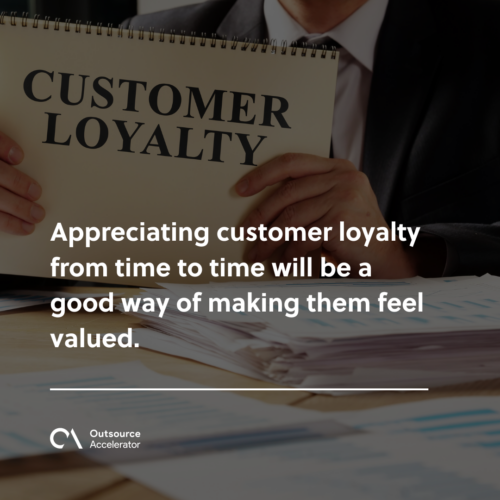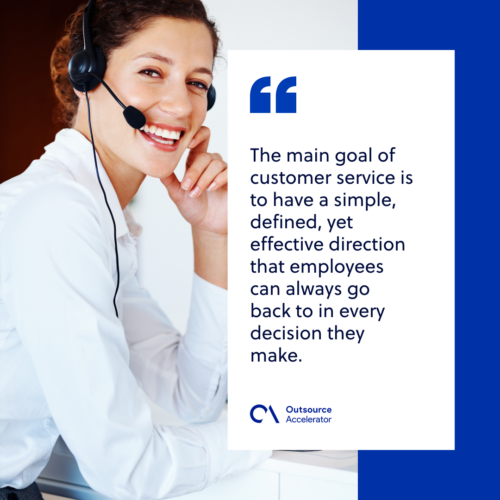Top 10 goals for customer service in 2025

With increasing competition and the availability of alternative options, customers have a voracious appetite for something better, fresher, and more efficient.
This constant pressure weighs heavily on business leaders. They always develop new strategies to clinch the loyalty of their market base.
Endless promos and campaigns are launched to get the market hooked. But the pandemic has seriously challenged this.
Clinching clients’ loyalty can be difficult, but setting customer service goals might make it possible.
Here are time-tested goals for customer service to get companies started by 2024.
Why do you need to set goals for customer service?
Impolite tone, unresponsiveness, and lack of proper decorum are just a few of the potential problems organizations should avoid to build a better rapport with customers.
Some of these issues can still arise despite the efforts of the management to maintain the quality of their service.
Having effective customer service goals mitigates this and others that could arise through the following.
1. Clear direction. When goals are simple and understandable, no gray areas form. Employees have confidence in the process and will perform as expected.
2. Better employee management. Measurable goals help managers in providing clear, constructive feedback. Employees will have a better grasp of their performance improvement pipelines.
3. Easier alignment. Different departments can synergize better. Understanding clear goals for collaboration will encourage employees to work together toward a common goal.
4. Better customer satisfaction. Cear metrics set the standards for excellent service and quality interactions with clients. This helps in securing their loyalty and solidifying their position in the market.
Top 10 goals for customer service to help you dominate the competition
Here are ten smart customer service goals to help enhance customer satisfaction:
1. Fast, faster, fastest first response time
The digital age has made customer interactions smoother, freer, and easier. Along with this convenience are clients’ reimagined expectations.
A client often expects a response within 15 to 30 minutes from a support team. In some cases, one hour of response time is within the acceptable threshold.
In social media, customers are even more demanding. Clients expect a response within one to six hours after their message so that organizations can address their queries.
Keeping this wait time as low as possible will help improve customer satisfaction. However, FRT is more than just providing a faster response. It is all about solving the customers’ needs.
Clients appreciate accurate and simple solutions to their concerns rather than fast yet sloppy responses.

2. Omnichannel service
End-users have varied preferences in which channel they are most comfortable. There are those who only like calls, and others chat or video calls.
Many companies are denied the opportunity to reach their end-users because of the lack of awareness of this.
Opening the company to various channels will attract more customers from diverse demographics.
The only difficulty in executing an omnichannel strategy is the synergy of the entire company to provide the desired customer experience.
To ensure better coordination, one of the goals for customer service should be the centrality of client concerns.
3. Actively eliciting customer feedback
Feedback allows room for growth. It might be difficult to accept some of the flaws, but it will be helpful in ensuring the quality of products and services.
Key to an exemplary customer service strategy is making the clients feel that their insights are valuable. Turning them to the most ardent of critics will be fruitful for both parties: end-users can expect more improvements, while the management can be assured of the continued support of its market base.
Conducting periodic surveys can help restrategize and align with the shifting trends in the market. At the same time, it will ensure that the business is on top of the competition.
4. Appreciating customer loyalty
Usually, customer loyalty is taken for granted by businesses. Just because an end-user availed of the products or services, one or twice does not mean they will continue to do so.
Appreciating them from time to time will be a good way of making them feel valued. Some freebies like company merchandise or huge exclusive discounts are small investments in maintaining their loyalty to the brand.

5. Proactive innovation
Competitors will always look for a better way of doing business to lead the market. Setting a goal for customer service centered on technological efficiency in the company will help employees perform better and end-users connected.
For example, adapting collaborative tools will help departments function better to come up with integrative solutions.
Meanwhile, an updated website with an easy-to-use interface facilitates better customer browsing of products and services.
The existence of various tools and software in the market encourages better interaction between clients and brands. It is only a matter of adapting to these innovations.
6. Customer service automation
Almost every company uses chatbots across multiple channels. It is an efficient way to reduce costs in customer service and can offer 24/7 support.
However, automation can only do so much. It cannot replace human interaction and intuition. The use of these chatbots and automated technologies are situational. Careful consideration and strategy is necessary to avoid turning off loyal end-users.
7. Utilizing social media
Social media has become a top platform for customers to search information. This makes clients virtually present 24/7 on these platforms.
Launching strategic campaigns across these multiple platforms would be advantageous for the business.
But just because there are many users online does not mean they will automatically consume the content produced by the company. Piquing their interests is another challenge that needs to be overcome.
A mixture of vlogs, influencer videos, and creative content will drive traffic to company pages. Not to mention, sales catch the curious eyes of end-users.
8. Prioritizing employee growth
There is no shortcut to creating an excellent customer service experience plan. Agents and staff still remain as the best asset in creating a happy client.
This makes employee training and growth crucial to this. The more talented an employee is, the more excellent their performance will be. This will drive positive feedback from clients.
Satisfied clients will be more loyal and receptive to any changes in the brand. In addition, they will become organic endorsers of the products through word of mouth.
The best way to invest in employee growth is through a progressive career plan. If agents or employees feel that they have an opportunity to grow in an organization, they will do everything to exceed expectations.
This will have a domino effect on the productivity of the enterprise as a whole.
9. Client empowerment
Customers are always on the go. They want everything faster and laid out to them in the simplest terms.
As much as possible, they would not want to call customer support as it takes a lot of time waiting for an agent to entertain them.
FAQs or integrated search tools on the website would be helpful for them to get the answers they need. Just be sure to break down any instructions in the easiest way possible.
In selecting which client issues can be relegated to FAQs, a thorough analysis of the calls and complaints would be necessary to identify the most common issues encountered by customers.
Providing supplementary links and information is fine as long as they are not complicated.
10. Mobile-friendly customer service
The pandemic has made smartphones the presence of marketing and communication. Almost 55% of global website traffic is through smartphones.
This fact is easily neglected by businesses and enterprises in handling their online presence. They readily assume that their website will be compatible with mobile devices which have different configurations.
Mobile compatibility and friendliness should be considered a top priority of every company to ensure that all content and features of existing websites and pages are working properly.
Make arrangements to link the SMS and call to these websites for ease of communication.
Best practices in making your goals for customer service happen
Setting goals is easy but keeping them realized is a different matter altogether. It needs a systematic approach to have the desired impact it was designed for.
There are various ways to make sure that goals for customer service come to fruition. Below are three tried and tested practices corporations have been doing:
Be realistic
Goals are good, but if they are close to impossible, then it has no function at all. The main goal of customer service is to have a simple, defined, yet effective direction that employees can always go back to in every decision they make.
If the goals are too complicated, execution might come as a challenge. Hence, goals for customer service must always be clear and practical for everyone to follow.
Set measurable expectations
There are a lot of customer service metrics used by the industry in measuring customer happiness.
CSAT and NPS are reliable tools that help in assessing if the customers are satisfied. Integrate the goals for customer service of the organization in these tools for faster integration of improvement and future adjustments.
The results of these metrics provide a clear path for improvement for the company to undertake.
Dates matter
Deadlines and established checkpoints are important to establish a sense of urgency. This also pushes departments to finish the task at hand to address problems during checkpoints.
Deadlines also provide a sense of alignment for different divisions to collaborate strategically.

Developing a customer-centric business
The current market climate is filled with competition, higher customer expectations, and faster technological innovation.
This business environment makes customer loyalty volatile. Whoever can provide what the end-users want and need gets their loyalty.
Adapting a business model anchored on the consumer is the right path. Redirecting a company toward this is not difficult. All it takes is empathy for the customers.
It might be difficult to adapt at first, but with the help of clear, defined, and measurable goals for customer service, it is possible to do so.
There are various third-party service providers that can supply the technical advice needed to implement the changes needed systematically.







 Independent
Independent




